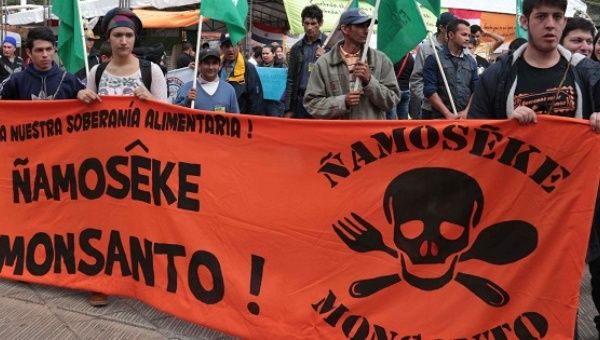Monsanto Accused of Using Ghostwriters to Cover up Cancer Risk
HEALTH, 20 Mar 2017
teleSUR – TRANSCEND Media Service
The agrochemical giant is accused using its own employees to write reports on the cancer risks of the world most-used weedkiller, Roundup.

Monsanto’s signature product roundup has already been deemed a cancer risk by the World Health Organization. | Photo: EFE
16 Mar 2017 – Agrochemical giant Monsanto used ghostwriters on scientific reports to cover up the risk of cancer from its flagship weedkiller, plaintiffs in a case in a U.S. Federal Court in San Francisco have claimed in a lawsuit.
RELATED: Colombia Restarts Controversial Glyphosate Fumigation of Coca
Lawyers suing Monsanto on behalf of farmers and others in the mass litigation presented documents to the court claiming that the company had failed to warn the public that exposure to its most popular weedkiller, Roundup, was known to cause non-Hodgkin’s lymphoma, a type of cancer. Roundup is the most-used weed killer in history.
Employes at the company were accused of writing reports that were used to determine if one of the key ingredients in Roundup, glyphosate, was not carcinogenic. The company’s toxicology manager is accused of ghostwriting sections of a scientific report in 2013 under the names of other scientists and another manager was seen to ghostwrite sections of another report from 2000.
On the back of the false reports, the U.S. Environmental Protection Agency deemed that Roundup posed no cancer risk. The company has denied that it carried out such activities and says that the claims the allegations are based on “cherry-pick” from one email.
httpv://www.youtube.com/watch?v=PTi0_ZQtPTY
In the email in question, an executive from the company said that ghostwriters could help cut down on costs and researchers “would just edit & sign their names so to speak.”
RELATED: Monsanto Faces Years of Resistance Against GMO Corn in Mexico
While court filings said that the EPA “may be unaware of Monsanto’s deceptive authorship practice,” former deputy director of the EPA, Jess Rowland, was accused of colluding with Monsanto to bury the real scientific research on glyphosate and its links to cancer.
Citing an email from a Monsanto employee, Roland reportedly said, “If I can kill this (the study) I should get a medal.” Rowland has been the central figure in more than 20 lawsuits in the U.S.
In a separate lawsuit, a district court ruled that California could classify glyphosate as a cancer risk. The World Health Organization had previously upgraded glyphosate as a carcinogen.
Go to Original – telesurtv.net
DISCLAIMER: The statements, views and opinions expressed in pieces republished here are solely those of the authors and do not necessarily represent those of TMS. In accordance with title 17 U.S.C. section 107, this material is distributed without profit to those who have expressed a prior interest in receiving the included information for research and educational purposes. TMS has no affiliation whatsoever with the originator of this article nor is TMS endorsed or sponsored by the originator. “GO TO ORIGINAL” links are provided as a convenience to our readers and allow for verification of authenticity. However, as originating pages are often updated by their originating host sites, the versions posted may not match the versions our readers view when clicking the “GO TO ORIGINAL” links. This site contains copyrighted material the use of which has not always been specifically authorized by the copyright owner. We are making such material available in our efforts to advance understanding of environmental, political, human rights, economic, democracy, scientific, and social justice issues, etc. We believe this constitutes a ‘fair use’ of any such copyrighted material as provided for in section 107 of the US Copyright Law. In accordance with Title 17 U.S.C. Section 107, the material on this site is distributed without profit to those who have expressed a prior interest in receiving the included information for research and educational purposes. For more information go to: http://www.law.cornell.edu/uscode/17/107.shtml. If you wish to use copyrighted material from this site for purposes of your own that go beyond ‘fair use’, you must obtain permission from the copyright owner.